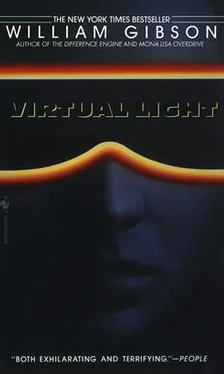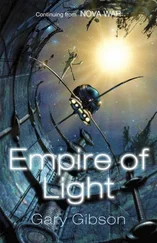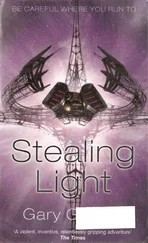You couldn’t tell what it was made of, and that meant expensive. Something dark gray, like the lead in a pencil, thin as the shell of one of those eggs, but you could probably drive a truck over it. Like her bike. She’d figured out how you opened it the night before; finger here, thumb there, it opened. No catch or anything, no spring. No trademark, either; no patent numbers. Inside was like black suede, but it gave like foam under your finger.
Those glasses, nested there. Big and black. Like that Orbison in the poster stuck to Skinner’s wall, black and white. Skinner said the way to put a poster up forever was use condensed milk for the glue. Kind that came in a can. Nothing much came in cans, anymore, but Chevette knew what he meant, and the weird big-faced guy with the black glasses was laminated solid to the white-painted ply of Skinner’s wall.
She pulled them from the black suede, the stuff springing instantly back to a smooth flat surface.
They bothered her. Not just that she’d stolen them, but they weighed too much. Way too heavy for what they were, even with the big earpieces. The frames looked as though they’d been carved from slabs of graphite. Maybe they had, she thought; there was graphite around the paper cores in her bike’s frame, and it was Asahi Engineering.
Rattle of the spatula as Skinner swirled the eggs. She put them on. Black. Solid black.
“Katharine Hepburn” Skinner said.
She pulled them off. “Huh?”
“Big glasses like that.”
She picked up the lighter he kept beside the Coleman, clicked it, held the flame behind one lens. Nothing.
“What’re they for, welding?” He put her share of the eggs in an aluminum mess-tray stamped 1951. Set it down beside a fork and her mug of black coffee.
She put the glasses on the table. “Can’t see through ’em. Just black.” She pulled up the backless maple chair and sat, picking up the fork. She ate her eggs. Skinner sat, eating his, looking at her. “Soviet” he said, after a swallow from his thermos-mug.
“Huh?”
“How they made sunglasses in the ol’ Soviet. Had two factories for sunglasses, one of ’em always made ’em like that. Kept right on puttin’ ’em out in the stores, nobody’d buy ’em, buy the ones from the other factory. How the place packed it in.”
“The factory made the black glasses?”
“Soviet Union.”
“They stupid, or what?”
“Not that simple… Where’d you get ’em?”
She looked at her coffee. “Found ’em.” She picked it up and drank.
“You working, today?” He pulled himself up, stuffed the front of his shirt down into his jeans, the rusted buckle on his old leather belt held with twisted paper clips.
“Noon to five.” She picked up the glasses, turning them. They weighed too much for how big they were.
“Gotta get somebody up here, check the fuel cell…”
“Fontaine?”
He didn’t answer. She bedded the glasses in black suede, closed the case, got up, took the dishes to the wash-basin. Looked back at the case on the table.
She’d better toss them, she thought.
Rydell took a CalAir tilt-rotor out of Burbank into Tuesday’s early evening. The guy in San Francisco had paid for it from the other end; said call him Freddie. No seatback fun on CalAir, and the passengers definitely down-scale. Babies crying. Had a window seat. Down there the spread of lights through the faint glaze of some previous passenger’s hair-oil: the Valley. Turquoise voids of a few surviving pools, lit subsurface. A dull ache in his arm.
He closed his eyes. Saw his father at the kitchen sink of his mobile home in Florida, washing out a glass. At that precise moment the death no doubt already growing in him, established fact, some line crossed. Talking about his brother, Rydell’s uncle, three years younger and five years dead, who’d once sent Rydell a t-shirt from Africa. Army stamps on the bubblepack envelope. One of those old-timey bombers, B-52, and WHEN DIPLOMACY FAILS.
“Is that the Coast Highway, do you think?”
Opened his eyes to the lady leaning across him to peer through the film of hair-oil. Like Mrs. Armbruster in fifth grade; older than his father would be now.
“I don’t know” Rydell said. “Might be. All just looks like streets to me. I mean” he added, “I’m not from here.”
She smiled at him, settling back into the grip of the narrow seat. Completely like Mrs. Armbruster. Same weird combination of tweed, oxford-cloth, Santa Fe blanket coat. These old ladies with their bouncy thick-soled shoes.
None of us are.” Reaching out to pat his khaki knee. “Not these days.” Kevin had said it was okay to keep the pants.
“Uh-huh” Rydell said, his hand feeling desperately for the recliner button, the little dimpled steel circle waiting to tilt him back into the semblance of sleep. He closed his eyes.
“I’m on my way to San Francisco to assist in my late husband’s transfer to a smaller cryogenic unit” she said. “One that offers individual storage modules. The trade magazines call them ‘boutique operations,’ grotesque as that may seem.”
Rydell found the button and discovered that CalAir’s seats allowed a maximum recline of ten centimeters.
“He’s been in cryo, oh, nine years now, but I’ve never liked to think of his brain tumbling around in there like that. Wrapped in foil. Don’t they always make you think of baked potatoes?”
Rydell’s eyes opened. He tried to think of something to say.
“Or like tennis shoes in a dryer” she said. “I know they’re frozen solid, but there’s nothing about it that seems like any kind of rest, is there?”
Rydell concentrated on the seatback in front of him. A plastic blank. Gray. Not even a phone.
“These smaller places can’t promise anything new in the way of an eventual awakening, of course. But it seems to me that there’s an added degree of dignity. I think of it as dignity, in any case.”
Rydell glanced sideways. Found his gaze caught in hers: hazel eyes, mazed there in the finest web of wrinkles.
“And I certainly won’t be there if he’s ever thawed, or, well, whatever they might eventually intend to do with them. I don’t believe in it. We argued about it constantly. I thought of all those billions dead, the annual toll in all the poor places. ‘David,’ I said, ‘how can you contemplate this when the bulk of humanity lives without air-conditioning?’”
Rydell opened his mouth. Closed it.
“Myself, I’m a card-carrying member of Cease Upon the Midnight.”
Rydell wasn’t sure what ‘card-carrying’ meant, but Cease Upon the Midnight was mutual self-help euthanasia, and illegal in Tennessee. Though they did it there anyway, and someone on the force had told him that they left milk and cookies out for the ambulance crews. Did it eight or nine at a time, mostly. CUTM. ‘Cut ’em,’ the paramedics called it. Offed themselves with cocktails of legally prescribed drugs. No muss, no fuss. Tidiest suicides around.
“Excuse me, ma’am” Rydell said, “but I’ve got to try to catch a little sleep here.”
“You go right ahead, young man. You do look rather tired.”
Rydell closed his eyes, put his head back, and stayed that way until he felt the rotors tilting over into descent-mode.
“Tommy Lee Jones” the black man said. His hair was shaped like an upside-down flowerpot with a spiral path sculpted into the side of it. Sort of like a Shriner’s fez, but without the tassel. He was about five feet tall and his triple-oversized shirt made him look nearly as wide. The shirt was lemon-yellow and printed with life-size handguns, in full color, all different kinds. He wore a huge pair of navy blue shorts that came to way below his knees, Raiders socks, sneakers with little red lights embedded in the edges of the soles, and a pair of round mirrored glasses with lenses the size of five-dollar coins.
Читать дальше











